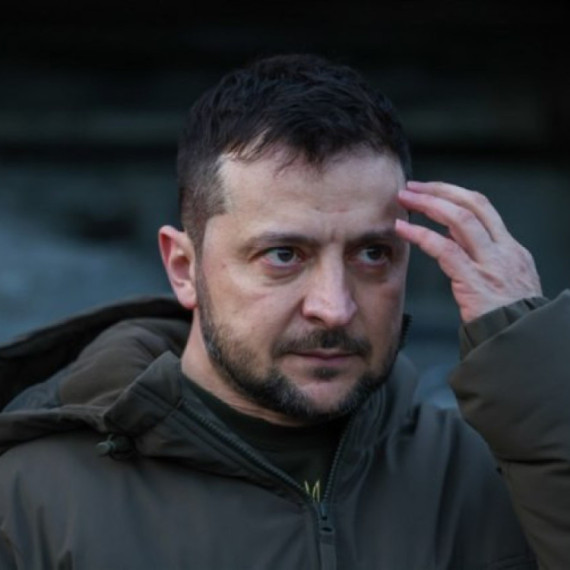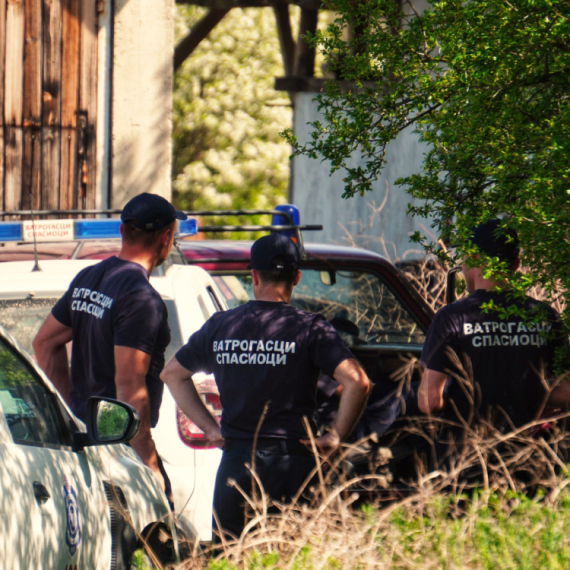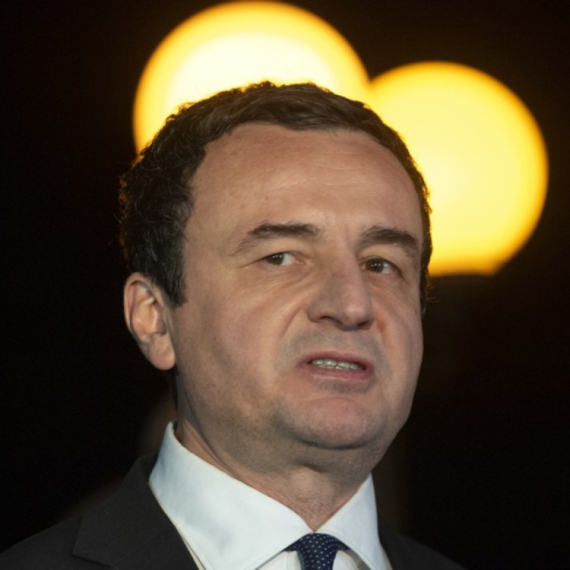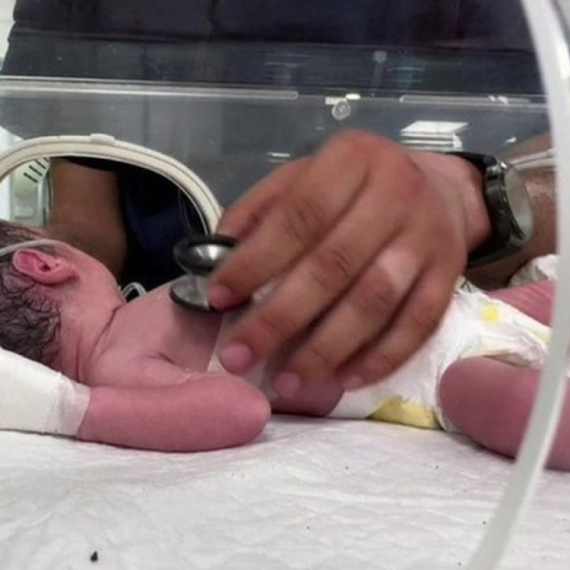FM: Negotiations only way to solution
Serbia's Foreign Minister Vuk Jeremić said in New York on Wednesday that negotiations were the only way to reach a sustainable and lasting solution for Kosovo.
Wednesday, 08.02.2012.
09:12

Serbia's Foreign Minister Vuk Jeremic said in New York on Wednesday that negotiations were the only way to reach a sustainable and lasting solution for Kosovo. At the same time, he told a Security Council session dedicated to the situation in the province, its Resolution 1244 "must be followed explicitly when it comes to Pristina's regional representation". FM: Negotiations only way to solution Jeremic said that Serbia wanted the UN Security Council to support the centrality of its resolutions in terms of the talks between Belgrade and Pristina, adding that Serbia would request new consultations regarding the claims of human organ trafficking. Stressing that the latest report on Kosovo submitted by UN chief Ban Ki-moon acknowledges progress in the talks between Belgrade and Pristina, Jeremic stated that Serbia was still committed to the process as it was the only legitimate mechanism of overcoming differences. "The pursuit of outcomes outside the framework of negotiations is both futile and counter-productive," Jeremic noted, adding that talks conducted in good faith were the only way to a sustainable solution. Serbian President Boris Tadic repeated a number of times that the solution for Kosovo has to secure international guarantees that would protect Serbia's interest there, by ensuring a realistic solution for northern Kosovo, protection for Serb enclaves in the south, Serb identity and religious heritage throughout the territory and a solution to property issues, Jeremic pointed out. Commenting on Pristina's regional representation, Jeremic said Serbia had never intended to prevent anyone's voice from being heard, including Pristina's, but that it had to be done explicitly and unambiguously according to Resolution 1244. He also talked about the part of Ban's report that refers to the Medicus case and claims of human organ trafficking. EULEX cannot operate to its full capacity outside of Kosovo and has no appropriate mandate to allow it to do a full investigation, he remarked. "Only an investigation conducted under the auspices of the Security Council can ensure that," he said, adding that otherwise many of those suspected of involvement in organ trafficking could evade justice. "When it comes to such matters in the Balkan context, a mandate to investigate has always been bestowed by the Security Council. It should happen again-not only for the sake of consistency, but to ensure the investigation becomes transparent and accountable to the whole world," said the minister. Serbia welcomes the Security Council's earlier attempts to reach an agreement on how to investigate those claims and will request new consultations within the body, he stressed. "We must not yield on this-both on moral and human rights grounds. Serbia will therefore seek another round of Security Council consultations on the issue," he underlined. Jeremic noted that Serbia agreed with Ban's concerns over the latest events related to privatization in Kosovo. The Kosovo authorities formed a privatization agency that took over by force the role of the institution formed by UNMIK in 2002, which secured compensation funds for the original owners after Serbian companies had been privatized, Jeremic said. Jeremic recalled the part of Ban's report stating that over the past few months there has been a "significant weaken[ing] of the protection of the privatization funds" and curtailing of international oversight of the privatization and liquidation processes. Jeremic said that approximately a quarter of a billion euros are being held in banks of various UN member States, and that it is likely that the 'Kosovo Privatization Agency' will try to gain access to the funds. "The financial institutions that hold these deposits must not release them until an agreement is reached between the stakeholders. This is a very serious liability issue, and we shall not refrain from using all juridical mechanisms at our disposal to protect our property rights," Jeremic underlined. According to Jeremic, this is a matter which requires an urgent attention of the Security Council. "The actions by the 'Kosovo Privatization Agency' amount to a usurpation of the authority and jurisdiction of a UN-created institution. This could set a precedent with serious consequences for all UN peacekeeping operations," he warned. Speaking about North Kosovo, he said that the situation there remains volatile, as a result of attempts to unilaterally alter the reality on the ground - in violation of resolution 1244 (1999), and against the will of the majority-Serb population. Jeremic warned that, as in previous reporting periods, there have been a number of incidents directed against ethnic-Serbs in South Kosovo, the gravest one having taken place in Dobrusa-an isolated, majority-Albanian village in the South Kosovo municipality of Istok. "A family of Kosovo Serb IDPs had gone to visit their abandoned property for the first time in many years. They were greeted by an ethnic-Albanian neighbor, who then went back into his home. Soon thereafter, the Report informs us, "he opened fire on [the] three Kosovo Serb [returnees] with an automatic rifle, killing one and injuring two," Jeremic pointed out, adding that acts of desecration and vandalism against Serbian Orthodox Church holy sites and cemeteries continue to take place. (Tanjug, file) Unstable Kosovo affects dialogue The potentially unstable situation in northern Kosovo has significantly impacted the EU-facilitated dialogue between Pristina and Belgrade, as well as the discussions on the European perspective of the region, UN Secretary General Ban Ki-moon assessed in his latest report on Kosovo, adding that status quo is not a way towards a permanent solution to the Kosovo issue. The Security Council session at which the Secretary General's report is being discussed is under way. Ban stated that "optimistic assumptions that durable solutions might simply evolve from the status quo, without a strong vision for the way forward and a united engagement of the international community, are belied by dynamics on the ground, in particular in northern Kosovo.“ "Although tensions in the area subsided by the end of the reporting period, I remain concerned over the volatile situation there, which carries a continued risk of provocations and of an escalation of inter-ethnic tensions,“ Ban stated in the report encompassing the period from 16 October 2011 to 15 January 2012. "Partly as a consequence of positions and actions taken during the previous reporting period by Pristina, the Kosovo Serbs and Belgrade, the situation in northern Kosovo continues to be tense and potentially unstable, influencing much of the present political discourse. It has also significantly impacted the EU-facilitated dialogue between Pristina and Belgrade, as well as the discussions on the European perspective of the region, “Ban's report reads. The Secretary General recalled that "on December 9, the Council of the European Union postponed its decision on Serbia's EU candidate status until March 2012, with some members making specific reference to the situation in northern Kosovo.” “Developments during the last quarter of 2011 have further demonstrated that risks to peace and stability from the Kosovo issue continue to confront the people on the ground and the international community,” it is stated in the report. “The EU-facilitated dialogue in Brussels has shown that practical agreements to alleviate daily problems faced in Kosovo are achievable. I commend the parties for restarting the dialogue under challenging circumstances, and for demonstrating renewed faith in a process designed to resolve differences in a peaceful manner,” Ban added. “I am pleased that some positive results were achieved during the intensive sessions held in November and early December, and that there is now visible progress in the implementation of previously reached agreements. The agreement on the integrated management of crossing points, although not implemented yet, represents an important breakthrough that can lead to the full normalization of the situation at the northern gates, and the restoration of full freedom of movement throughout the North,” Ban said. “I note with continued concern that progress appears to be slowing on two major issues essential for reconciliation, voluntary returns of the displaced and determining the fate of missing persons. In both areas, I hope that the coming year will be a time for redoubling efforts to assert the political will, not simply the technical resources, and to strengthen the cooperation that is required to produce better results,” Ban stressed. “It is my hope that the members of the Security Council will reinforce the firm messages delivered to the parties by UNMIK,” Ban said, adding that “it remains crucial that initiatives undertaken by the international actors operating within the framework of the United Nations and resolution 1244 (1999) are strategically aligned and closely coordinated, in the overall interest of maintaining peace and stability in Kosovo.” Tanjug
FM: Negotiations only way to solution
Jeremić said that Serbia wanted the UN Security Council to support the centrality of its resolutions in terms of the talks between Belgrade and Priština, adding that Serbia would request new consultations regarding the claims of human organ trafficking.Stressing that the latest report on Kosovo submitted by UN chief Ban Ki-moon acknowledges progress in the talks between Belgrade and Priština, Jeremić stated that Serbia was still committed to the process as it was the only legitimate mechanism of overcoming differences.
"The pursuit of outcomes outside the framework of negotiations is both futile and counter-productive," Jeremić noted, adding that talks conducted in good faith were the only way to a sustainable solution.
Serbian President Boris Tadić repeated a number of times that the solution for Kosovo has to secure international guarantees that would protect Serbia's interest there, by ensuring a realistic solution for northern Kosovo, protection for Serb enclaves in the south, Serb identity and religious heritage throughout the territory and a solution to property issues, Jeremić pointed out.
Commenting on Priština's regional representation, Jeremić said Serbia had never intended to prevent anyone's voice from being heard, including Priština's, but that it had to be done explicitly and unambiguously according to Resolution 1244.
He also talked about the part of Ban's report that refers to the Medicus case and claims of human organ trafficking.
EULEX cannot operate to its full capacity outside of Kosovo and has no appropriate mandate to allow it to do a full investigation, he remarked.
"Only an investigation conducted under the auspices of the Security Council can ensure that," he said, adding that otherwise many of those suspected of involvement in organ trafficking could evade justice.
"When it comes to such matters in the Balkan context, a mandate to investigate has always been bestowed by the Security Council. It should happen again-not only for the sake of consistency, but to ensure the investigation becomes transparent and accountable to the whole world," said the minister.
Serbia welcomes the Security Council's earlier attempts to reach an agreement on how to investigate those claims and will request new consultations within the body, he stressed.
"We must not yield on this-both on moral and human rights grounds. Serbia will therefore seek another round of Security Council consultations on the issue," he underlined.
Jeremić noted that Serbia agreed with Ban's concerns over the latest events related to privatization in Kosovo.
The Kosovo authorities formed a privatization agency that took over by force the role of the institution formed by UNMIK in 2002, which secured compensation funds for the original owners after Serbian companies had been privatized, Jeremić said.
Jeremić recalled the part of Ban's report stating that over the past few months there has been a "significant weaken[ing] of the protection of the privatization funds" and curtailing of international oversight of the privatization and liquidation processes.
Jeremić said that approximately a quarter of a billion euros are being held in banks of various UN member States, and that it is likely that the 'Kosovo Privatization Agency' will try to gain access to the funds.
"The financial institutions that hold these deposits must not release them until an agreement is reached between the stakeholders. This is a very serious liability issue, and we shall not refrain from using all juridical mechanisms at our disposal to protect our property rights," Jeremić underlined.
According to Jeremić, this is a matter which requires an urgent attention of the Security Council.
"The actions by the 'Kosovo Privatization Agency' amount to a usurpation of the authority and jurisdiction of a UN-created institution. This could set a precedent with serious consequences for all UN peacekeeping operations," he warned.
Speaking about North Kosovo, he said that the situation there remains volatile, as a result of attempts to unilaterally alter the reality on the ground - in violation of resolution 1244 (1999), and against the will of the majority-Serb population.
Jeremić warned that, as in previous reporting periods, there have been a number of incidents directed against ethnic-Serbs in South Kosovo, the gravest one having taken place in Dobruša-an isolated, majority-Albanian village in the South Kosovo municipality of Istok.
"A family of Kosovo Serb IDPs had gone to visit their abandoned property for the first time in many years. They were greeted by an ethnic-Albanian neighbor, who then went back into his home. Soon thereafter, the Report informs us, "he opened fire on [the] three Kosovo Serb [returnees] with an automatic rifle, killing one and injuring two," Jeremić pointed out, adding that acts of desecration and vandalism against Serbian Orthodox Church holy sites and cemeteries continue to take place.
Unstable Kosovo affects dialogue
The potentially unstable situation in northern Kosovo has significantly impacted the EU-facilitated dialogue between Priština and Belgrade, as well as the discussions on the European perspective of the region, UN Secretary General Ban Ki-moon assessed in his latest report on Kosovo, adding that status quo is not a way towards a permanent solution to the Kosovo issue.The Security Council session at which the Secretary General's report is being discussed is under way.
Ban stated that "optimistic assumptions that durable solutions might simply evolve from the status quo, without a strong vision for the way forward and a united engagement of the international community, are belied by dynamics on the ground, in particular in northern Kosovo.“
"Although tensions in the area subsided by the end of the reporting period, I remain concerned over the volatile situation there, which carries a continued risk of provocations and of an escalation of inter-ethnic tensions,“ Ban stated in the report encompassing the period from 16 October 2011 to 15 January 2012.
"Partly as a consequence of positions and actions taken during the previous reporting period by Priština, the Kosovo Serbs and Belgrade, the situation in northern Kosovo continues to be tense and potentially unstable, influencing much of the present political discourse. It has also significantly impacted the EU-facilitated dialogue between Priština and Belgrade, as well as the discussions on the European perspective of the region, “Ban's report reads.
The Secretary General recalled that "on December 9, the Council of the European Union postponed its decision on Serbia's EU candidate status until March 2012, with some members making specific reference to the situation in northern Kosovo.”
“Developments during the last quarter of 2011 have further demonstrated that risks to peace and stability from the Kosovo issue continue to confront the people on the ground and the international community,” it is stated in the report.
“The EU-facilitated dialogue in Brussels has shown that practical agreements to alleviate daily problems faced in Kosovo are achievable. I commend the parties for restarting the dialogue under challenging circumstances, and for demonstrating renewed faith in a process designed to resolve differences in a peaceful manner,” Ban added.
“I am pleased that some positive results were achieved during the intensive sessions held in November and early December, and that there is now visible progress in the implementation of previously reached agreements. The agreement on the integrated management of crossing points, although not implemented yet, represents an important breakthrough that can lead to the full normalization of the situation at the northern gates, and the restoration of full freedom of movement throughout the North,” Ban said.
“I note with continued concern that progress appears to be slowing on two major issues essential for reconciliation, voluntary returns of the displaced and determining the fate of missing persons. In both areas, I hope that the coming year will be a time for redoubling efforts to assert the political will, not simply the technical resources, and to strengthen the cooperation that is required to produce better results,” Ban stressed.
“It is my hope that the members of the Security Council will reinforce the firm messages delivered to the parties by UNMIK,” Ban said, adding that “it remains crucial that initiatives undertaken by the international actors operating within the framework of the United Nations and resolution 1244 (1999) are strategically aligned and closely coordinated, in the overall interest of maintaining peace and stability in Kosovo.”

























































Komentari 12
Pogledaj komentare